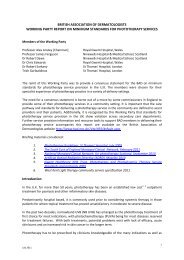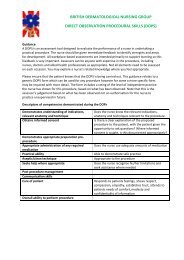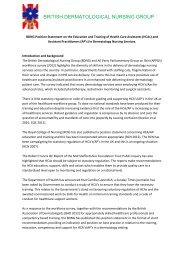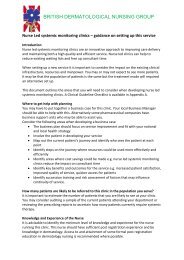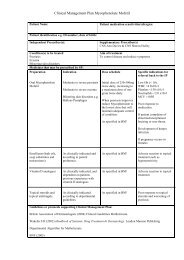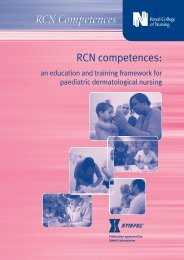Improving outcomes for people with skin tumours including melanoma
Improving outcomes for people with skin tumours including melanoma
Improving outcomes for people with skin tumours including melanoma
You also want an ePaper? Increase the reach of your titles
YUMPU automatically turns print PDFs into web optimized ePapers that Google loves.
One RCT conducted <strong>with</strong> patients <strong>with</strong> <strong>melanoma</strong> found that a 6-<br />
week structured psychiatric group intervention improved patients’<br />
affective states and coping styles at 6 weeks follow-up and at 6<br />
months follow-up.<br />
<strong>Improving</strong> Outcomes <strong>for</strong><br />
People <strong>with</strong> Skin Tumours<br />
<strong>including</strong> Melanoma<br />
Patient-centred care<br />
One RCT conducted <strong>with</strong> patients <strong>with</strong> <strong>melanoma</strong> found that a 6-<br />
week, structured psychiatric group intervention, which included<br />
health education, was associated <strong>with</strong> a survival advantage, after<br />
adjusting <strong>for</strong> gender and Breslow thickness.<br />
Evidence from systematic reviews and meta-analyses suggests that<br />
psychological, educational and supportive interventions are beneficial<br />
<strong>for</strong> patients <strong>with</strong> cancer.<br />
Effectiveness of patient feedback<br />
2<br />
Evidence from an observational study suggests that patients <strong>with</strong><br />
cancer who respond to questionnaire surveys are younger and<br />
experience fewer illness-related problems than patients who do not<br />
respond. Two expert reviews reported that rigorously designed<br />
patient-satisfaction questionnaires can bring about improvement in<br />
service provision, in terms of better implementation of guidelines,<br />
improvement of safety and increased patient satisfaction.<br />
Clinical trials<br />
One high-quality systematic review investigated patient <strong>outcomes</strong><br />
related to mortality and morbidity among participants and nonparticipants<br />
in clinical trials. RCTs of different specialities were<br />
included, but the largest proportion was of patients <strong>with</strong> cancer. The<br />
review found little evidence <strong>for</strong> better <strong>outcomes</strong> through participation<br />
in trials aside from those arising from the effects of the treatments<br />
compared, or differences between participants and non-participants.<br />
The same review found no evidence of greater risk arising from trial<br />
participation.<br />
A previous, poorer-quality systematic review than the one cited above<br />
examined evidence <strong>for</strong> better patient <strong>outcomes</strong> through RCT<br />
participation. The majority of RCTs were of patients <strong>with</strong> cancer. The<br />
review concluded that it is likely that clinical trials have a positive,<br />
rather than a negative, effect on survival and morbidity <strong>outcomes</strong>,<br />
<strong>with</strong> benefits arising from the use of trial protocols.<br />
One literature review found that children and adolescents <strong>with</strong><br />
<strong>melanoma</strong> are not entered into clinical trials. Retrospective studies<br />
have found that adolescents <strong>with</strong> cancer are not as likely to be<br />
entered into clinical trials as children and adults.<br />
Guidance on cancer services: <strong>skin</strong> <strong>tumours</strong> <strong>including</strong> <strong>melanoma</strong><br />
41




